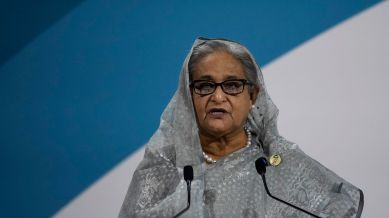Stay updated with the latest - Click here to follow us on Instagram
Awami League won’t be allowed to contest Bangladesh polls: Yunus’ adviser
"The elections will be contested among pro-Bangladesh groups only,” declared Mahfuz Alam, a prominent leader of the Anti-Discrimination Movement, at a street rally in Chandpur district.

Bangladesh’s turbulent political landscape took a dramatic turn on Saturday as a key adviser to Muhammad Yunus’s interim government announced that Sheikh Hasina’s Awami League would not be allowed to participate in future elections.
“The elections will be contested among pro-Bangladesh groups only,” declared Mahfuz Alam, a prominent leader of the Anti-Discrimination Movement, at a street rally in Chandpur district. Alam, who played a pivotal role in the mass uprising that toppled Hasina’s regime and forced her into exile on August 5 last year, further stated that only Khaleda Zia’s Bangladesh Nationalist Party (BNP), Jamaat-e-Islami, and other “pro-Bangladesh” groups would continue their political activities in the country.
monthly limit of free stories.
with an Express account.
He added, “Either of these will establish future governance through a fair electoral process. But Awami League’s rehabilitation will not be allowed in this country.” Alam, now a de facto minister without portfolio in Yunus’s administration, emphasized that no elections would be held until “minimum reforms” were implemented and institutions, allegedly destroyed by the “fascist Hasina government,” were rebuilt.
The announcement came amidst rising tensions over political reforms and the exclusion of the once-dominant party from the country’s political arena.
Once a special assistant in Yunus’s government, Alam later rose to the position of adviser in the interim cabinet. During a UN General Assembly function last year, Yunus had introduced Alam as the “main brain” behind the “meticulously” orchestrated student-led movement that ousted the Awami League regime.
Since the events of August 5, 2024, the Awami League has been virtually erased from Bangladesh’s political scene, with most of its leaders either imprisoned on charges ranging from murder to corruption or in hiding, both domestically and abroad.
The BNP, however, has voiced its opposition to banning any political party, hinting at a measured stance on the Awami League’s political future. The party called for elections to be held as soon as possible following minimal reforms. BNP Secretary General Mirza Fakhrul Islam Alamgir recently warned that the interim government must not drag out its reforms, which could otherwise take a decade, saying, “An unelected government must not continue for a longer period.”
Speculation is mounting about the formation of a youth-led political party by the student leaders who spearheaded the anti-Awami League movement. The BNP has cautioned that the interim government could lose credibility if its members were to form a party while still in power.
Meanwhile, Asif Mahmud Sajeeb Bhuiyan, Local Government and Youth and Sports Adviser and another key figure in the Anti-Discrimination Movement, hinted at competition over public welfare initiatives in a Facebook post on Saturday.
Information Affairs Adviser Nahid Islam, another prominent student leader, suggested that advisers of the current government might resign from their posts if required to form the new party and contest in future elections.
Last month, Muhammad Yunus stated that the next general election might take place by late 2025 or the first half of 2026. However, he noted that the election’s timing would depend on achieving political consensus and the extent of the reforms required.